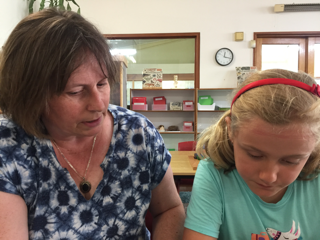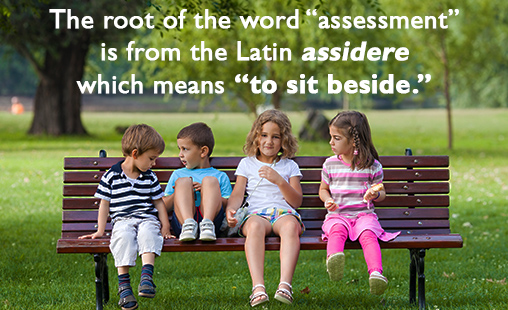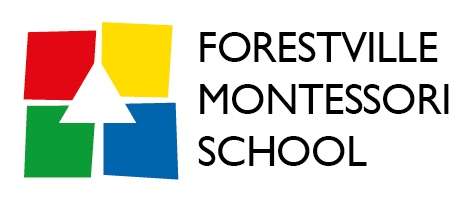Assessments & Testing
in Our Montessori Environments

 Sarah Beresford–Jones, Inclusive Education Coordinator
Sarah Beresford–Jones, Inclusive Education Coordinator
Welcoming Sarah
Parents often ask us, “How will I know that my child has reached the right level of literacy skills?”
It’s a fair and justified question for parents to ask. It’s particularly important for Montessori schools to answer this question as by choice and in tune with the Montessori philosophy, many parents won’t have NAPLAN results or other tests for comparison.
At FMS, we’re getting ready to provide you with answers that will show you how well your child is progressing in literacy. We started by searching for someone who is Montessori trained and has a background in inclusive education to assist us. We were thrilled to find Sarah Beresford–Jones.
Sarah has over 20 years Montessori experience as a Director. She has an AMI Diploma for 0-3, AMI Diploma for 3-6 and a Montessori International Diploma, 6-9 and 9-12 Years. Her Masters is in Inclusive Education and Leadership.
Sarah has been tasked with benchmarking our students’ literacy levels and providing the Directors with guidance on any necessary intervention. You can discuss this approach further with your child’s Director at the Parent Conferences coming up soon. Written reports will also be available by the end of Term 2 2018.
In the meantime, enjoy Sarah’s article.
ASSESSMENTS & TESTING IN MONTESSORI ENVIRONMENTS
A Montessori classroom is brimming with activities to develop skills. In our specifically prepared environments, the educators continually assess where your child is developmentally and guides them to the next stage. Within our classrooms this evaluation is carried out through a variety of methods.

We assess a child’s social skills and their ability to interact with others. We use parent teacher interviews to gain a deeper insight of the child from the information gathered from parents; children have conferences with their educator; children carry out small group work; and in the older age groups have work diaries and carry out peer marking. The specialised Montessori materials have an in built-in control of error and allows children to use their reasoning and problem-solving skills. The materials also give the child quick feedback on their work, rather than having to wait for an adult. We maintain portfolios of the child’s work and carry out daily observations of each child. We also use the individual student reports each semester, and we have recently introduced reading assessments.
So why should we use standardise testing in particular? The Montessori Trainer, Jean Miller, says “that as a school we know that governments put faith in standardise tests, so much so that it influences funding and policies. Montessori, herself, said we are to prepare children for the culture in which they live and to prepare them, so they will be successful in that culture, hence computers in the Cycle 3 classrooms. Testing is very much part of our culture as tests are seen as useful diagnostic tools for parents.” In a nutshell, we believe the assessments assist with providing parents with reassurance about their child’s progress.
Dr Montessori described ‘Total Reading’ as when children can read with ease. It is reading for pleasure and is complete comprehension and interpretation of the thoughts of another. The four important aspects are understanding the literal and implied meaning of the text; comprehending completely and accurately the thought, sentiment, and information expressed; recognition of style; and being aware of the cultural and historical context.
“Books are the quietest and most constant of friends; they are the most accessible and wisest of counsellors, and the most patient of teachers.”
Harvard President, Charles Eliot
To underpin our literacy work and try to make sure all children can experience ‘Total Reading’, FMS has recently introduced a consistent reading assessment to ensure dependable outcomes, using Fountas & Pinnell Literacy. Fountas & Pinnell was chosen because of its comprehensive approach and because it bridges primary and secondary reading age allowing children who may be reading up to Year 8 secondary level to demonstrate outcomes.
This has added to the repertoire that FMS offers families in order to have a clear overview of each child’s progress and development. By the end of Term 2 2018 if you have a primary aged child you will receive a written report updating you on your child’s reading ability.
Part of Sarah’s work is also to train the staff in the use of the Fountas & Pinnell assessment techniques. In this way, staff will readily be able to assess any child in our lower and upper primary at any time to ‘check’ progress.
